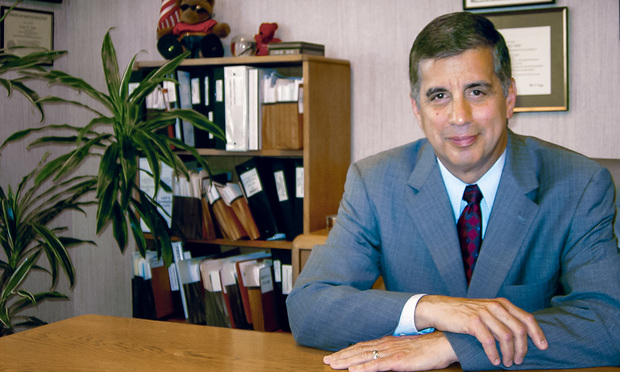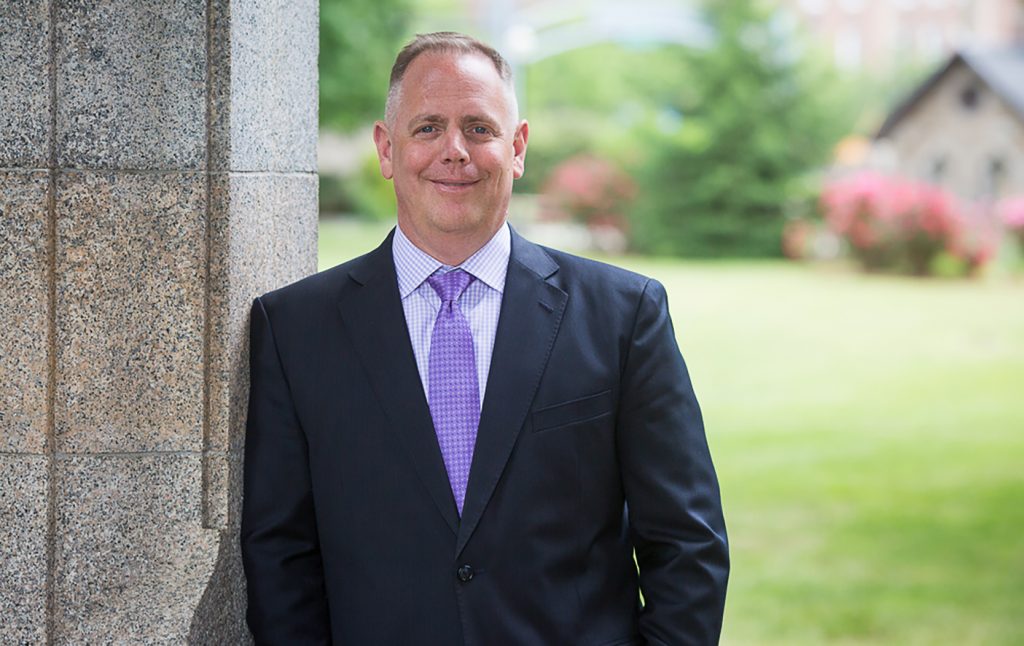Famed comedian Ron White has a decade-old bit in which he says he hates lawyers, recalling an infamous video of a man outside court who shoots an attorney repeatedly from point-blank range while the victim begs for his life, dodging and crouching behind a tree. White calls it the funniest thing he’s seen in his life.
“I’ve got that on my video iPod,” the comic snarls on his 2009 recording, “Behavioral Problems.” “If I just need a chuckle sometime during the day, I just hit the play button. Pow! Pow! Pow! Ha ha ha ha!”
While White used the viral video as springboard for laughs, the extended story was less amusing. According to news reports, the shooter, William Strier, was sentenced to life in prison in 2006 and died behind bars a year later. The attorney, Gerald Curry, survived the incident despite being hit by five bullets, but reportedly committed suicide in 2012 after struggling for years with post-traumatic stress disorder.
Hollywood often depicts attorneys as crass, dispassionate antagonists, concerned only about collecting a fee. Joking or not, these characterizations can get under the skin of a profession that is already rooted in conflict. So how does one cope with the associated stress?
The Connecticut Law Tribune recently reached out to attorneys across the state to ask how they deal with the pressures of the job and what tips they have for lawyers and law students at all levels on alleviating stress, putting negative thoughts into a better perspective and avoiding patterns that contribute to feelings of doom, which can lead to more serious problems.
 Job stress and related problems “simply can’t be ignored” by law professionals, says Louis Pepe.
Job stress and related problems “simply can’t be ignored” by law professionals, says Louis Pepe.
Louis R. Pepe, a partner with McElroy, Deutsch, Mulvaney & Carpenter, said lawyer stress and associated depression, alcoholism and drug abuse are recognized career hazards that “simply cannot be ignored” by the industry. “Moreover, I do not believe it will ever be different,” he said. “We are a service industry that has become highly competitive in recent years. It is a buyer’s market for legal services, and the consumer knows that. Online providers continue to take more and more market share. All of that translates into increasing pressure on the practitioner.”
The American Bar Association has warned that career attorneys face disproportionate struggles with mental health issues, ranging from anxiety and depression to substance abuse and suicide. Lawyers are near the top in suicide rates and nearly four times more likely than other professionals to be depressed. The Journal of Addiction Medicine found in 2016 that more than one-fifth of licensed, employed attorneys qualify as problem drinkers, 28 percent struggle with depression and 19 percent have symptoms of anxiety.
While it is broadly agreed that acknowledging these problems is an important first step, lawyer-assistance organizations maintain that lawyers are facing a crisis, and vigilance is needed to address it. A detailed report released last month by the ABA’s National Task Force on Lawyer Well-Being provides more than 50 recommendations to tackle the problem of chronic stress among attorneys and law students, which the organization says is damaging the field as a whole.
“These findings are incompatible with a sustainable legal profession, and they raise troubling implications for many lawyers’ basic competence,” states “The Path to Lawyer Well-Being: Practical Recommendations for Positive Change.” “This research suggests that the current state of lawyers’ health cannot support a profession dedicated to client service and dependent on the public trust.”
Noting that stress can produce “a profound ambivalence” about work, the task force’s recommendations focus on five central themes: identifying stakeholders and the roles they can play in reducing job-related toxicity; eliminating stigma for those seeking help; emphasizing well-being as essential to core competence; educating law professionals; and taking steps to effect positive change.
Detailed recommendations include getting firm leadership to make a personal commitment to well-being, supporting diversity and inclusion, de-emphasizing alcohol at social events, developing confidential support networks and facilitating discussions about treatment and prevention.
A key theme among attorneys who responded to the Law Tribune’s questions about stress boils down to one word: balance. “The obvious answer is to always maintain a life balance,” Pepe said. “But in my experience, that is easier said than done. To put it bluntly, the client is not at all concerned about your ‘life balance.’ He needs immediate attention to his problem, and if you can’t provide that, he will get it elsewhere.”
It is understandably unlikely that a client will feel compelled to advise you on getting proper nutrition, sorting out family issues or making sure you are taking time for your morning meditation. But if one or more of these facets of your life is out of whack, problems can manifest in your work performance, which the client invariably scrutinizes. Thankfully, the consensus is that stress can often be alleviated by taking a step back, clearing your mind and focusing on simplicity.
 Remember the basics, says Diane Whitney, including getting plenty of rest and knowing that every problem has a solution.
Remember the basics, says Diane Whitney, including getting plenty of rest and knowing that every problem has a solution.
Environmental lawyer and former state Assistant Attorney General Diane W. Whitney of Pullman & Comley said it’s important to remember some of the basics, including “plenty of sleep, deep breaths and a reminder that, in the words of my partner Rob Morris, there is a solution for every problem.”
James “Jamie” Sullivan, managing partner at Howard, Kohn, Sprague & FitzGerald, is a triathlete who recommends getting your blood flowing. “I get through the stress of being a lawyer through physical exercise, e.g., running, biking, swimming, going to the gym. I would not be the lawyer that I am without exercise,” he said. “I exercise every day, and sometimes twice a day.”
Farmington solo practitioner Michelle Querijero agreed that exercise is an effective stress buster that she incorporates into her daily routine. “I make time to do some form of exercise at lunch. If I have time, I jog or do weights in the gym at work. Otherwise, I walk. I find that when I do that, even if it’s just 30 minutes away from my desk, I am more efficient in the afternoon and get more done. If I don’t, even if I take a few minutes to read the news instead of walking, I actually get less done and feel more drained at the end of the day. That few minutes away makes a huge difference.”
Prerna Rao, co-founder of Trumbull-based litigation firm Rao & Jo, also gave a plug to physical exercise, noting that stress increases cortisol levels in the blood. “Exercise helps you circulate and oxygenate your blood, reduces cortisol levels, increases your endorphin levels, plus takes your mind off the things for a bit,” she said, adding that a quick walk or run “immediately makes me feel better, and gets me back in the zone.”
Highly experienced attorneys such as former Connecticut chief disciplinary counsel and Tribune columnist Mark Dubois of Geraghty & Bonnano in New London will tell you that lawyers often experience stress at odd hours, in anticipation of important deliberations. “My stress hour is 2 a.m.,” he said. “Most lawyers seem to wake up like me between 1 and 3 to fret over the office or a case. I call them the ‘lawyers’ hours.’”
As a board member for the attorney-assistance group Lawyers Concerned for Lawyers Connecticut, Dubois has hands-on experience helping law professionals slay their demons. Funded by attorneys, LCLCT pays for sessions with mental health professionals, hosts talks and support groups with attorneys and judges and presents speakers at law schools and bar associations. The organization’s website provides links to substance-abuse, gambling, mental-health and other resources across the state.
LCLCT is proof that lawyers experiencing psychological troubles are not alone.
“The most stressful part of the job is the uncertainty of it all,” said Ryan McKeen of the Connecticut Trial Firm in Glastonbury. “Couple that with when you have someone working against you and clients who need results—often fast results—and you have stress.”
Like many respondents, McKeen said mindfulness is a necessity. “I cope with stress by using the Headspace app for daily meditation, meeting with my therapist Karen Caffrey every six weeks or so whether or not I think I need it and hitting the gym hard four times a week. These things give me balance and the support structure to deal with the stress of law practice,” he said.
Jay Ruane of Ruane Attorneys in Shelton agreed. “Three years ago I started transcendental meditation. That really helps,” he said. “I also keep a gratitude journal. Every night I review the things I write that I am grateful for. When having a stressful day I pull it out and read some random days. Finally, when at dinner with my kids, we do our daily gratitude. It’s amazing what kids will be grateful for and really gives you perspective.”
 Donald Papcsy recommends starting your day with meditation.
Donald Papcsy recommends starting your day with meditation.
Donald Papcsy of Papcsy Janosov Roche Trial Lawyers in Norwalk said it’s also good to begin the day with meditation. “I actually find, and preach to my friends and colleagues, starting each day by meditating (or praying, whichever is your thing), concentrating first thing on being thankful for all that I am blessed with in my life. And I mean the simple things. No. 1 is always just that you wake up every day with choice. Literally, most of the world’s population doesn’t wake up with the ability to choose what they want to do just because of their circumstances. So you go through the list: You are alive; hopefully you can get out of your bed; you have this beautiful world outside your door; hopefully you can see, hear and walk; you don’t live in a third-world country and are oppressed; you have food and drinks, and, if you are lucky to have family and friends, children, then that’s all gravy. The list goes as long as you want!”
In short, start your day feeling lucky for what you have instead of unlucky for what you don’t have and you’ll be on the right track, Papcsy said.
Carole Topol Orland of Broder & Orland in Westport reasoned that areas such as family law are often filled with highly charged emotions, and lawyers need to be prepared to face that environment. “Yes, stress is a normal part of our profession,” she said. “Having practiced for over 40 years, I have learned to cope by focusing on positive solutions rather than allowing myself to get mired down in stressful situations. I am also most fortunate to have an office of supportive attorneys and staff on whom I can draw when things get rough. We find humor to be a great antidote.”
Finding time away from work is also important to many attorneys. “Of course, building in time away from the office is key as well, whether it’s a day off or a week away,” Orland said. “Having the discipline to stay away from electronics during this time is so important. For many, engaging in hobbies, talents or interests provides a great diversion from the stress of work. For me, it’s watching my beloved Red Sox every night—which can be stressful, but less so lately—and spending time with my grandchildren. At the end of the day, it’s really about balance.”
Robert Storace contributed to this article.
NOT FOR REPRINT
© 2024 ALM Global, LLC, All Rights Reserved. Request academic re-use from www.copyright.com. All other uses, submit a request to [email protected]. For more information visit Asset & Logo Licensing.


 For comedians like Ron White, “killing” is a good thing. In law, not so much.
For comedians like Ron White, “killing” is a good thing. In law, not so much.





